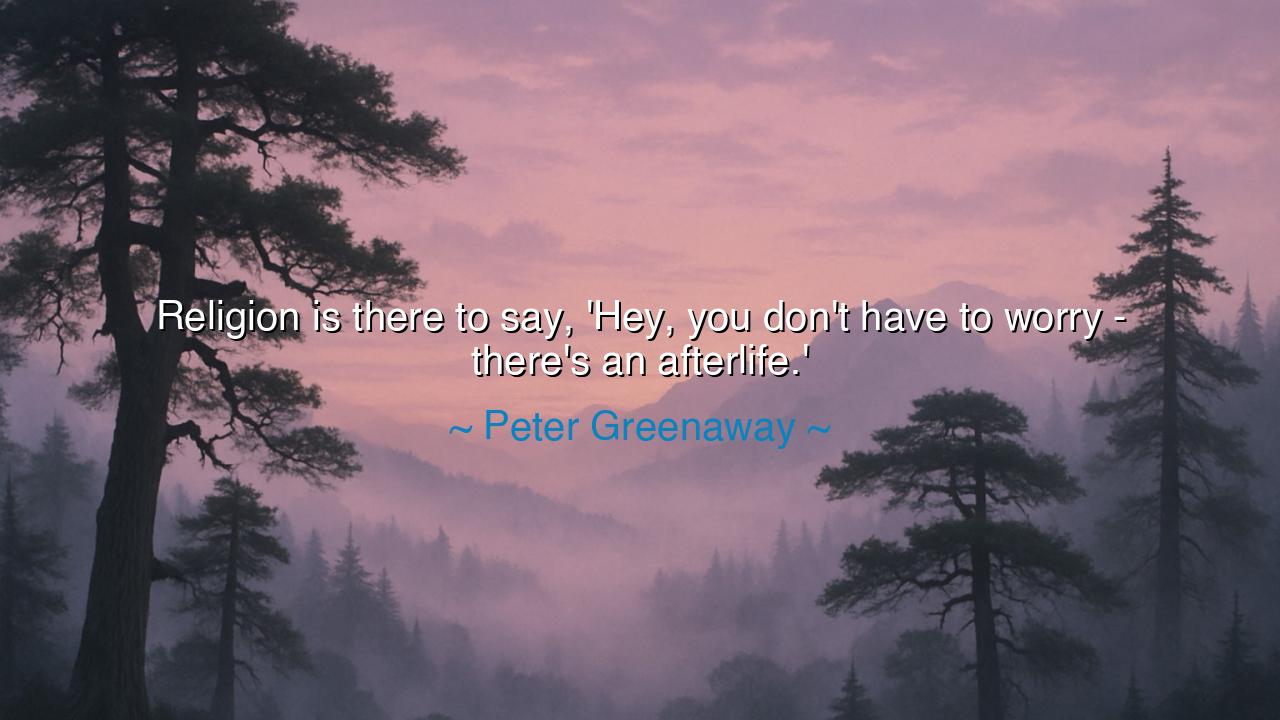
Religion is there to say, 'Hey, you don't have to worry - there's






The words of Peter Greenaway — "Religion is there to say, 'Hey, you don't have to worry - there's an afterlife.'" — strike at the heart of humanity’s oldest fears and greatest hopes. From the dawn of our existence, mankind has wrestled with the mystery of death, the silence beyond the grave, the terror of nothingness. In his words, Greenaway observes that religion offers solace in the face of this abyss, whispering to the trembling soul: “Do not fear, for life is not the end. There is something beyond.” Religion becomes not only a structure of worship but also a balm against despair, assuring the weary traveler that death is not a wall, but a door.
The origin of this truth lies in the very beginnings of civilization. Archaeologists uncover graves from tens of thousands of years ago, where the dead were buried with tools, ornaments, and food — evidence that even our ancient ancestors believed in an afterlife. From the pyramids of Egypt to the funeral pyres of India, humanity has clung to the conviction that the soul continues its journey. Religions across time — Christianity, Islam, Hinduism, Buddhism, and more — each offered visions of what lies beyond, from heaven’s radiant fields to the wheel of rebirth. Greenaway, as an observer of art and life, recognizes this common thread: that religion gives structure to hope, protecting us from the paralyzing weight of fear.
History is filled with examples of how this promise has strengthened people in times of trial. Consider the early Christians who faced persecution in the Roman Empire. Thrown to lions, burned as torches, hunted like criminals, they endured not because they loved death, but because they believed death was not the end. Their faith in an afterlife gave them courage that confounded their oppressors. The promise of eternal life was stronger than the terror of pain, and in that promise, their religion became a shield.
Or think of the Egyptian pharaohs, who built monuments of unimaginable grandeur, not merely as symbols of power, but as vessels to secure their place in eternity. The pyramids stand as stone testaments to mankind’s longing for immortality. Even if Greenaway’s words carry a note of critique — that religion soothes by saying, “Don’t worry” — the truth remains: for countless souls, this assurance has given meaning to suffering, purpose to sacrifice, and courage in the face of mortality.
Yet there is also caution in his statement. To lean too heavily upon the promise of the afterlife can cause one to neglect the duties of this life. Some may wait for paradise and ignore injustice on earth, or endure oppression in the hope of heavenly reward while failing to challenge cruelty in the present. Religion, in its noblest form, must not only comfort but also call us to live rightly now — to make this life a reflection of the eternity we seek. The afterlife should inspire better living, not passive waiting.
The teaching here is profound: religion offers hope against despair, but the wise must balance that hope with action. To believe in an afterlife is to quiet fear, but it must also embolden us to live this present life with courage, compassion, and dignity. Death will come to all, but whether we believe in paradise, reincarnation, or simply the legacy we leave, the comfort of meaning can transform how we live today.
The lesson for us is clear: do not fear death, but do not waste life. Let the hope of an afterlife calm your soul, but let the responsibility of this life stir your conscience. Live in such a way that, if eternity awaits, you are ready for it; and if this life is all, then you have filled it with goodness, truth, and beauty. In both ways, you win.
Thus let this wisdom endure: religion says, “Do not worry — there is more.” But the greater message is this: live now with such fullness of spirit, such honor, such love, that whether there is another world or not, you have already touched eternity.






AAdministratorAdministrator
Welcome, honored guests. Please leave a comment, we will respond soon